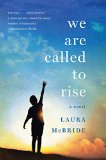Summary | Excerpt | Reading Guide | Reviews | Beyond the book | Read-Alikes | Genres & Themes | Author Bio

A Novel
by Laura McBrideLaura McBride's ambitious debut novel, set in 2008-9, is composed of four first-person, present-tense narratives. Each main character calls Las Vegas home and has, directly or indirectly, been affected by the Iraq War. When tragedy brings them together in the novel's second half, all four have a rare opportunity to show great acts of courage. As the Emily Dickinson poem that provides the novel's epigraph and title intones, "We never know how high we are / Till we are called to rise; / And then, if we are true to plan, / Our statures touch the skies—"
The first character we meet is Avis Gisselberg, 53. Once a casino worker and exotic dancer, she decides to introduce some romance into her declining marriage by delving into her lingerie. Bent over, nude, she is alarmed to find an old gun in the drawer. Her husband Jim chooses this rather compromising moment to tell her he is in love with Darcy, a younger colleague. McBride cleverly contrasts the black humor of this incident with the genuine hurt it reveals. Avis has had many reasons for heartache: growing up with teen mother Sharlene and her many deadbeat boyfriends scarred her, as did the loss of a daughter and the distressing changes in her 27-year-old son, Nate, who has recently returned from Iraq.
Avis, and especially Nate, will be crucial to the plot. However, there are three more narrators to come: Roberta Weiss, a volunteer social worker who grew up in one of Vegas's few Jewish families and has insistent memories of homeless, hopeless teens she worked with; Bashkim Ahmeti, a precocious eight-year-old Albanian refugee whose angry father and passive mother make ends meet by driving an ice cream truck; and Luis Rodriguez-Reyes, an injured 22-year-old soldier who has traded Iraq for a military hospital.
We start to see connections when Bashkim's school "adopts" soldiers serving in Iraq. The boy has a young American's optimistic patriotism, and writes Luis a cheery, inquisitive letter. The reply he receives is devastating: bitter and brutally honest. Luis made a mistake that caused a civilian death; moreover, his partner, Sam, died in an IED explosion. Luis's trauma is evident, and his despair understandable, yet the small action of writing this letter seems to set tragic events in motion. As one of the hospital staff, Dr. Ghosh, remarks, "things happen to us that are more than we can take. And we break."
One of McBride's chief skills is creating distinct voices. The narrative reveals each character's age, class, and experiences. For instance, Luis's Mexican-American heritage and troubled state of mind are evident in his slang, choppy phrases, and crude military banter. Social worker Roberta's passages stand out for their lyrical appreciation of Nevada's scenery: "I like Las Vegas best early in the morning, when the knife-edged hills…are pleated with the shadows of a sideways slicing sun, when a great quiet sits softly over the tiled roofs, the disheveled cottonwood, the miles of empty roads." Meanwhile, young Bashkim's is the most amusing voice, rich with curiosity and unexpected wisdom: "Isn't it weird that we are at war with two countries [Iraq and Afghanistan] that look like Nevada?" he asks.
However, I was not convinced that these were the four essential voices. Roberta and Avis, middle-aged white women, are too similar, and Roberta's story struck me as thin and incidental. Likewise, Nate and Luis's stories repeat each other: I wondered if McBride might have combined these two soldier characters. Also, though I loved Bashkim's voice, I was so taken by his mother's perspective (when he interviews her for a school project) that I wished she, too, could have her own sections.
It is impossible to discuss the novel's central events without giving away too much. Suffice it to say that violence, a major component of the four narrators' memories, comes to the surface. I almost felt betrayed: these characters' lives are sad enough, I thought; how could McBride be so cruel? It helped to learn (from the author's note) that the novel is based on real events. Indeed, "the one thing that almost kept me from writing my story was that it was so unbearably sad," McBride confides. Knowing this actually happened placates my outrage.
Unfortunately, I found the ways in which the characters connect and recover to be somewhat predictable, and at times tedious in the telling. For the most part, though, I was able to put my cynicism aside and appreciate the way the author finds meaning in misfortune: "If, sometimes, an unspeakable horror arises from the smallest error, I choose to believe that it's possible for an equally unimaginable grandeur to grow from the tiniest gesture of love...Now we go forward. We figure it out. We act with courage."
![]() This review was originally published in The BookBrowse Review in July 2014, and has been updated for the
May 2015 edition.
Click here to go to this issue.
This review was originally published in The BookBrowse Review in July 2014, and has been updated for the
May 2015 edition.
Click here to go to this issue.

If you liked We Are Called to Rise, try these:

by Adrienne Sharp
Published 2019
From the nationally bestselling author of The True Memoirs of Little K, a deeply felt and historically detailed novel of family, loss, and love, told by an irrepressible young girl - the daughter of a two-bit gangster and a movie showgirl - growing up in golden-age Hollywood and Las Vegas in its early days.

by Elizabeth McKenzie
Published 2016
An exuberant, one-of-a-kind novel about love and family, war and nature, new money and old values by a brilliant New Yorker contributor
Your guide toexceptional books
BookBrowse seeks out and recommends the best in contemporary fiction and nonfiction—books that not only engage and entertain but also deepen our understanding of ourselves and the world around us.